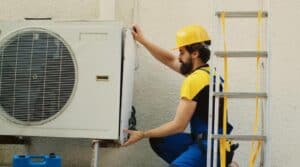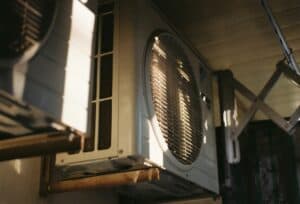
Keeping the air in your home clean and fresh is more important than ever. Good air quality can make a big difference in your family’s health and comfort. Many people don’t realize that indoor air can be filled with pollutants like dust, pet dander, and even harmful chemicals. These pollutants can cause allergies, asthma, and other health problems if they aren’t properly managed.
One of the most effective ways to improve your home’s air quality is by using high-quality air filters. These filters trap pollutants and prevent them from circulating through the air in your home. Simple changes like replacing your air filters regularly can have a huge impact on the air you breathe.
Another crucial factor to consider is ventilation. Proper ventilation helps remove stale air and brings in fresh air, which can reduce the concentration of indoor pollutants. This can be as simple as opening windows or using exhaust fans in kitchens and bathrooms. By ensuring proper airflow, you can keep your indoor environment healthier and more comfortable.
Adding indoor plants to your home is another easy and natural way to improve air quality. Plants absorb carbon dioxide and release oxygen, making the air fresher. Some plants can even remove toxins from the air, making them a great addition to any room.
Finally, regular HVAC maintenance is essential for keeping your air quality high. HVAC systems can accumulate dust and debris over time, which can then be circulated throughout your home. Regular checkups and cleaning can keep your system running efficiently and your air clean.
Improving your home’s air quality doesn’t have to be hard. With a few simple steps, you can make your indoor environment healthier and more comfortable for everyone.
Use High-Quality Air Filters
Using high-quality air filters is one of the simplest and most effective ways to improve your home’s air quality. Standard filters trap dust and debris, but high-quality filters can capture much smaller particles, including pollen, mold spores, and even some bacteria. These filters are often rated by a minimum efficiency reporting value (MERV), which tells you how effectively they capture airborne particles. The higher the MERV rating, the better the filter is at trapping pollutants.
Replacing your air filter regularly is crucial. A clogged filter won’t do its job effectively and can even strain your HVAC system, making it work harder and less efficiently. Most experts recommend changing your filter every three months, but you might need to do it more often if you have pets or live in an area with a lot of dust or pollen.
Another option to consider is using a HEPA (High-Efficiency Particulate Air) filter. HEPA filters are extremely effective at capturing tiny particles. They can remove up to 99.97% of particles as small as 0.3 microns, which includes many allergens and some bacteria. While HEPA filters can be more expensive, the benefits to your air quality are worth considering.
Maintain Proper Ventilation
Proper ventilation plays a significant role in maintaining good air quality. Without adequate airflow, pollutants can build up inside your home, making the air stale and potentially harmful. Good ventilation helps to remove these pollutants and brings in fresh air, which can balance humidity levels and reduce the concentration of indoor toxins.
One easy way to improve ventilation is by opening windows and doors whenever weather permits. This natural airflow can quickly refresh the air inside. Another effective method is using exhaust fans in areas prone to moisture and odors, like kitchens and bathrooms. Make sure these fans vent to the outside and are not recirculating air back into the house.
For homes that are tightly sealed, mechanical ventilation systems might be necessary. These systems can provide a constant stream of fresh air without sacrificing energy efficiency. Heat recovery ventilators (HRVs) and energy recovery ventilators (ERVs) are popular choices. HRVs exchange stale indoor air with fresh outdoor air, recovering heat in the process, while ERVs also manage humidity levels. Both options help keep your indoor environment healthy without wasting energy.
Good ventilation keeps your home feeling fresh and helps control moisture levels, reducing the risk of mold and mildew. By making a few adjustments to improve airflow, you can significantly enhance the quality of the air in your home.
Incorporate Indoor Plants
Adding indoor plants to your home can greatly improve air quality naturally. Plants act as natural air purifiers by absorbing carbon dioxide and releasing oxygen. Some plants can even remove toxins from the air, such as formaldehyde, benzene, and trichloroethylene, which are commonly found in household products.
Here are a few top plants that improve air quality:
1. Snake Plant: This plant is great for bedrooms as it releases oxygen at night. It is also known for removing toxins.
2. Spider Plant: Easy to care for and effective in removing pollutants like formaldehyde and xylene.
3. Aloe Vera: Not only good for skin care, but also helps filter the air and needs minimal watering.
4. Peace Lily: Known for its ability to remove toxins and is also aesthetically pleasing with its white flowers.
Besides cleaning the air, plants also add humidity, which can be important in dry climates or during winter months when heating systems dry out the indoor air.
Place plants in different rooms to maximize their benefits. However, make sure you take good care of them by watering appropriately and providing enough light. Healthy plants can make a big difference in creating a fresher and healthier indoor environment.
Regular HVAC Maintenance
Regular HVAC maintenance is crucial for maintaining good air quality in your home. Your heating and cooling system can accumulate dust, debris, and even mold over time. Without regular cleaning, these contaminants can be recirculated throughout your home, impacting the air you breathe.
1. Change Air Filters: Regularly changing your air filters can prevent the buildup of dust and pollutants. Experts recommend changing filters every three months or more often if you have pets or allergies.
2. Clean Ducts and Vents: Dust and debris can collect in your ducts and vents. Having them cleaned every few years can make a huge difference.
3. Check for Mold: Mold can grow in the damp areas of your HVAC system. Regular inspections can catch and address mold issues before they spread.
4. Professional Tune-ups: Routine checkups by a professional can catch potential problems early, ensuring your system runs efficiently and the air remains clean.
Regular maintenance keeps your HVAC system running efficiently, which can also save you money on energy bills. Clean systems are more efficient and less likely to break down, providing continuous, clean airflow throughout your home.
Conclusion
Improving the air quality in your home doesn’t have to be complicated. Simple steps like using high-quality air filters, maintaining proper ventilation, incorporating indoor plants, and regular HVAC maintenance can make a big difference. Clean air not only improves your health but also makes your home more comfortable and inviting.
Taking action to improve your indoor air quality is a wise investment. By following these tips, you can breathe easier and enjoy a healthier living environment. Regular attention to these areas can prevent potential health problems and keep your home in the best condition.
For professional residential HVAC services and expert tips on improving indoor air quality, reach out to My Jockey. Serving Saratoga Springs and The Capital Region, NY, we offer top-tier HVAC maintenance and air purification solutions. Call us today to schedule your service and enhance the air quality in your home!




